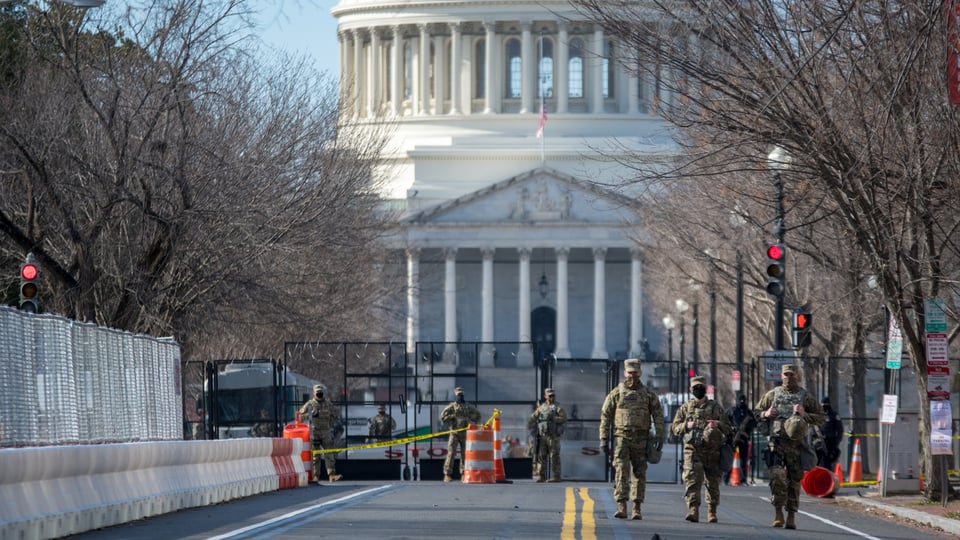What’s Behind the Storming of the U.S. Capitol?
The takeover of the U.S. Capitol has joined the ranks of some of the darkest days in American history. What’s behind America’s increasingly violent divisions?

On Wednesday, Jan. 6, 2021, a mob overwhelmed the police guarding the U.S. Capitol building in Washington, D.C., where Congress was meeting to confirm the votes of the Electoral College. The group forced their way in and took over much of the building. The lawmakers were quickly evacuated to a safe location.
Windows were broken, offices ransacked and government property stolen before order was restored. Four deaths were reported among the crowd, including a woman shot trying to force her way into an area where lawmakers were sheltering. A policeman later died of injuries he received grappling with an attacker.
This is the first time the Capitol has been successfully assaulted since British redcoats burned it in 1814 (during the War of 1812).
The shockwaves of this event rapidly rippled around the world. America’s friends look on aghast at our shame and wonder whether our mounting confusion signals their own to come. America’s enemies rub their hands with glee as they plot to take advantage of our distraction, disarray and disunity. Nondemocratic nations quickly jumped on the violence as evidence that American-style republicanism does not work.
What does this mean for the United States? How did we come to this humiliating place? Where will things go from here?
A lesson from the past
On Jan. 27, 1838, Abraham Lincoln addressed the Young Men’s Lyceum of Springfield, Illinois, on the topic of “The Perpetuation of Our Political Institutions.” Several quotes are striking in the light of the past year’s rioting, property destruction and violent death, and especially the storming of the Capitol.
Lincoln said: “At what point shall we expect the approach of danger? By what means shall we fortify against it? Shall we expect some transatlantic military giant, to step the Ocean, and crush us at a blow? Never! All the armies of Europe, Asia and Africa combined, with all the treasure of the earth (our own excepted) in their military chest; with a Buonaparte for a commander, could not by force, take a drink from the Ohio, or make a track on the Blue Ridge, in a trial of a thousand years.
“At what point then is the approach of danger to be expected? I answer, if it ever reach us, it must spring up amongst us. It cannot come from abroad. If destruction be our lot, we must ourselves be its author and finisher. As a nation of freemen, we must live through all time, or die by suicide.”
Steps toward national suicide
He went on to describe what form that suicide might take:
“I hope I am over wary; but if I am not, there is, even now, something of ill-omen, amongst us. I mean the increasing disregard for law which pervades the country; the growing disposition to substitute the wild and furious passions, in lieu of the sober judgment of Courts; and the worse than savage mobs, for the executive ministers of justice. This disposition is awfully fearful in any community; and that it now exists in ours, though grating to our feelings to admit, it would be a violation of truth, and an insult to our intelligence, to deny. Accounts of outrages committed by mobs, form the every-day news of the times.”
More and more Americans are willing to hurt, even kill, fellow citizens over political opinions.
Mr. Lincoln was addressing the divisive passions aroused over slavery, which two decades later led to the Civil War. That war resulted in the deaths of 620,000 men, 2 percent of the American population, and ultimately to Lincoln’s own assassination.
Defiance of the rule of law, hatred for those with different opinions, self-granted entitlement to resort to violence—these brought catastrophe in the 1860s. It appears they may well bring catastrophe once again. We witness uncontrolled mob action with increasing frequency. It is sometimes even excused by elected officials. More and more Americans are willing to hurt, even kill, fellow citizens over political opinions.
Much closer to the war, in 1858, Abraham Lincoln began another important speech by quoting Jesus: “A house divided against itself cannot stand.”
It is now impossible to escape the fact that the United States is such a house. The divisions spring from politics based on increasingly disparate worldviews and values, and from different fears, all stoked by partisan media. We increasingly see violence in the streets, and now even in what should be the hallowed and respected halls of the Capitol.
Recent developments in media allow people to take their news from conspiratorial sources that blend fact and opinion, to propose alternate views of not only politics, but of reality, of the nature of society, of science, of history and even of obvious human biology.
The decay of truth
The term post-truth is being used to describe a society where facts no longer matter much, and where opinions and emotions are taken as unassailable.
In 2018 the RAND Corporation published a report entitled Truth Decay, An Initial Exploration of the Diminishing Role of Facts and Analysis in American Public Life. It explores “the growing disregard for facts, data, and analysis in political and civil discourse in the United States. Increasingly, it seems that important policy debates, both within the federal government and across the electorate, are as likely to hinge on opinion or anecdote as they are on objective facts or rigorous analysis” (p. iii).
A Nov. 19, 2020, Christian Science Monitor article titled “Post-Truth Politics: As Trump Pushes ‘Fraud,’ Partisans Pick Their Own Reality” includes a quote from Republican Al Schmidt, a Philadelphia city commissioner, who told CNN he understands some are happy and some are upset about the results of the recent presidential election. “One thing I can’t comprehend,” he continued, “is how hungry people are to consume lies.” Just so.
Lies can seem comforting. They appear to relieve us from facing unpleasant facts. But the Bible states that lying is never good; lies are of the adversary. God cannot lie (Titus 1:2). But of Satan, Jesus said, “When he speaks a lie, he speaks from his own resources, for he is a liar and the father of it” (John 8:44).
Revelation 22:15 speaks of a category of people who will not be afforded entry into the Kingdom of God: “whoever loves and practices a lie.” To do so puts one in direct opposition to God, whose every word is truth (John 17:17).
That so many Americans are cavalier about truth, and even love lies, indicates how deeply the nation has come under Satan’s sway. In God’s reality, true reality, there is no negotiating the truth. There is simply truth, and God will not ultimately allow compromise with it.
These trends have been building for decades and, at some point, will reach a final and terrible crescendo.
How did we get here?
How have we come to this? It began when, as a nation, we gradually rejected God, whose blessing this nation asked at its founding, to whom we have appealed for help and guidance many times, before whom our forefathers promised to strive to be a Christian “city upon a hill.”
We have rejected His Word, which some now openly curse. In our vanity we live the conceit that we know best how best to live, that nothing is forbidden and nothing is required.
We grope for a way forward, but we cannot find one. No political party or leader can fix this problem.
To ancient Israel, God explained a curse that would result if they abandoned Him and His instructions: “The LORD will strike you with madness and blindness and confusion of heart. And you shall grope at noonday, as a blind man gropes in darkness; you shall not prosper in your ways; you shall be only oppressed and plundered continually, and no one shall save you” (Deuteronomy 28:28-29).
Here we are as a nation, increasingly blind, mad and confused. We grope for a way forward, but we cannot find one. No political party or leader can fix this problem.
God speaks to our nation today, as He did to ancient Judah, through the prophet Isaiah:
“Woe to those who call evil good, and good evil; who put darkness for light, and light for darkness; who put bitter for sweet, and sweet for bitter! Woe to those who are wise in their own eyes, and prudent in their own sight!” (Isaiah 5:20–21).
Is there a solution?
The solution is simple. But it is not easy. We must turn to the God of the Bible. We must acknowledge and repent of our national sins—our pride, our injustice, our envy, our violence, our lust, our presumption and our arrogance.
A national day of prayer and fasting would be a very good start. In the middle of the brutal American Civil War, Abraham Lincoln proclaimed just such a day:
“I do, by this my proclamation, designate and set apart Thursday, the 30th day of April, 1863, as a day of national humiliation, fasting and prayer. And I do hereby request all the People to abstain, on that day, from their ordinary secular pursuits, and to unite, at their several places of public worship and their respective homes, in keeping the day holy to the Lord, and devoted to the humble discharge of the religious duties proper to that solemn occasion.”
Two months later, at Gettysburg, the tide of the war decisively turned, although many more men were to die before peace would prevail and the Union would be restored.
There are two possible outcomes before this nation, just as God put it to Judah in Isaiah’s time:
“‘Come now, and let us reason together,’ says the LORD, ‘Though your sins are like scarlet, they shall be as white as snow; though they are red like crimson, they shall be as wool. If you are willing and obedient, you shall eat the good of the land; but if you refuse and rebel, you shall be devoured by the sword’; for the mouth of the LORD has spoken” (Isaiah 1:18-20).
Judah chose foolishly and was devoured by the sword, though God mercifully spared a remnant. It seems unlikely also that the United States will repent as a nation, but there is still time. Even if the nation doesn’t repent, you can.
In any event, the clock is ticking, and a reckoning is sure to come.
Photo credit:
iStock.com/ALFSnaiper
Date Posted: January 12, 2021



